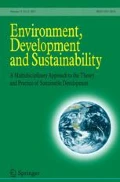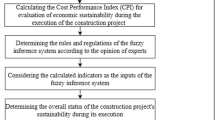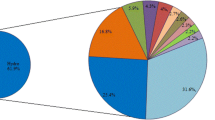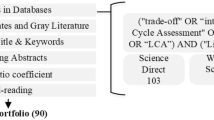Abstract
There is limited research that considers the sustainability aspect of the projects’ schedule. The present study proposes a model to cover this gap by considering sustainable development criteria. A multi-objective model with four objective functions, including minimizing cost, risk, and socio-environmental impacts, has been presented to decrease the project’s delay. Since some of the parameters are considered under conditions of uncertainty for the proximity of problems to real projects, the robust programming method is used to deal with the uncertainty, and the epsilon-constraint method was applied to solve the multi-objective model. Several scenarios are also defined to analyze the sensitivity of robust parameters in the generation of Pareto-based solutions, and the obtained results are also investigated. In addition, the design of experiments is applied for response surface methodology to determine the optimal levels of robust parameters that can generate solutions with greater variety. A real case study has been developed to implement different steps of the proposed model. Since the outcomes of the model determine the duration of each activity according to the objectives and different levels of robust parameters, managers and project owners can use this model as a tool to make appropriate decisions for their projects’ schedules.






Similar content being viewed by others
References
Alcaraz, J., & Maroto, C. (2001). A robust genetic algorithm for resource allocation in project scheduling. Annals of operations Research, 102(1–4), 83–109.
Ali, S., Maciejewski, A. A., Siegel, H. J., & Kim, J.-K. (2004). Measuring the robustness of a resource allocation. IEEE Transactions on Parallel and Distributed Systems, 15(7), 630–641.
Almahmoud, E., and Doloi, H. K. (2015). Assessment of social sustainability in construction projects using social network analysis. Facilities.
Asasi, M. K. G. (1980). Constitution of the Islamic Republic of Iran. Middle East Journal, 34, 181–204.
Badiru, A. B., and Osisanya, S. O. (2016). Project management for the oil and gas industry: a world system approach: CRC Press.
Ben-Tal, A., El Ghaoui, L., Nemirovski, A. (2009). Robust optimization (Vol. 28): Princeton University Press.
Bertsimas, D., & Sim, M. (2003). Robust discrete optimization and network flows. Mathematical programming, 98(1–3), 49–71.
Beyer, H.-G., & Sendhoff, B. (2007). Robust optimization–a comprehensive survey. Computer methods in applied mechanics and engineering, 196(33–34), 3190–3218.
Boshkovska, E., Ng, D. W. K., Zlatanov, N., Koelpin, A., & Schober, R. (2017). Robust resource allocation for MIMO wireless powered communication networks based on a non-linear EH model. IEEE Transactions on Communications, 65(5), 1984–1999.
Chawla, V., Chanda, A., Angra, S., & Chawla, G. (2018). The sustainable project management: A review and future possibilities. Journal of Project Management, 3(3), 157–170.
CPLEX, S. J. I., Armonk, NY (2003). Ilog.
Deblaere, F., Demeulemeester, E., Herroelen, W., & Van de Vonder, S. (2007). Robust resource allocation decisions in resource-constrained projects. Decision Sciences, 38(1), 5–37.
Demeulemeester, E., Herroelen, W. (2011). Robust project scheduling (Vol. 9): Now Publishers Inc.
Farazmand, N., & Beheshtinia, M. (2018). Multi-objective optimization of time-cost-quality-carbon dioxide emission-plan robustness in construction projects. Journal of Industrial and Systems Engineering, 11(3), 102–125.
Hazır, Ö. (2015). A review of analytical models, approaches and decision support tools in project monitoring and control. International Journal of Project Management, 33(4), 808–815.
Herroelen, W., & Leus, R. (2005). Project scheduling under uncertainty: Survey and research potentials. European Journal of Operational Research, 165(2), 289–306.
Hornstein, H. A. (2015). The integration of project management and organizational change management is now a necessity. International Journal of Project Management, 33(2), 291–298.
Kaiser, M. G., El Arbi, F., & Ahlemann, F. (2015). Successful project portfolio management beyond project selection techniques: Understanding the role of structural alignment. International Journal of Project Management, 33(1), 126–139.
Ke, H., Liu, H., & Tian, G. (2015). An uncertain random programming model for project scheduling problem. International Journal of Intelligent Systems, 30(1), 66–79.
Kerzner, H. (2017). Project management: A systems approach to planning, scheduling, and controlling: John Wiley & Sons.
Kivilä, J., Martinsuo, M., & Vuorinen, L. (2017). Sustainable project management through project control in infrastructure projects. International Journal of Project Management, 35(6), 1167–1183.
Koo, C., Hong, T., & Kim, S. (2015). An integrated multi-objective optimization model for solving the construction time-cost trade-off problem. Journal of Civil Engineering and Management, 21(3), 323–333.
Lambrechts, O., Demeulemeester, E., & Herroelen, W. (2011). Time slack-based techniques for robust project scheduling subject to resource uncertainty. Annals of operations Research, 186(1), 443–464.
Liu, J., Zhao, X., & Yan, P. (2016). Risk paths in international construction projects: Case study from Chinese contractors. Journal of Construction Engineering and Management, 142(6), 05016002.
Mahmoudi, A., & Feylizadeh, M. R. (2018). A grey mathematical model for crashing of projects by considering time, cost, quality, risk and law of diminishing returns. Grey Systems: Theory and Application.
Marcelino-Sádaba, S., González-Jaen, L. F., & Pérez-Ezcurdia, A. (2015). Using project management as a way to sustainability. From a comprehensive review to a framework definition. Journal of Cleaner Production, 99, 1–16.
Mavrotas, G., & Florios, K. (2013). An improved version of the augmented ε-constraint method (AUGMECON2) for finding the exact pareto set in multi-objective integer programming problems. Applied Mathematics and Computation, 219(18), 9652–9669.
Mir, F. A., & Pinnington, A. H. (2014). Exploring the value of project management: linking project management performance and project success. International Journal of Project Management, 32(2), 202–217.
Mohammadipour, F., & Sadjadi, S. J. (2016). Project cost–quality–risk tradeoff analysis in a time-constrained problem. Computers and industrial engineering, 95, 111–121.
Mulvey, J. M., Vanderbei, R. J., & Zenios, S. A. (1995). Robust optimization of large-scale systems. Operations research, 43(2), 264–281.
Muriana, C., & Vizzini, G. (2017). Project risk management: A deterministic quantitative technique for assessment and mitigation. International Journal of Project Management, 35(3), 320–340.
Nicholas, J. M., Steyn, H. (2017). Project management for engineering, business and technology: Taylor & Francis.
Orm, M. B., & Jeunet, J. (2018). Time Cost Quality Trade-off Problems: A survey exploring the assessment of quality. Computers and Industrial Engineering, 118, 319–328.
Raith, A., Schmidt, M., Schöbel, A., & Thom, L. (2018). Multi-objective minmax robust combinatorial optimization with cardinality-constrained uncertainty. European Journal of Operational Research, 267(2), 628–642.
Rui, Z., Cui, K., Wang, X., Chun, J.-H., Li, Y., Zhang, Z., et al. (2018). A comprehensive investigation on performance of oil and gas development in Nigeria: Technical and non-technical analyses. Energy, 158, 666–680.
Silvius, A. G., Kampinga, M., Paniagua, S., & Mooi, H. (2017). Considering sustainability in project management decision making; An investigation using Q-methodology. International Journal of Project Management, 35(6), 1133–1150.
Soyster, A. L. (1973). Convex programming with set-inclusive constraints and applications to inexact linear programming. Operations research, 21(5), 1154–1157.
Svejvig, P., & Andersen, P. (2015). Rethinking project management: A structured literature review with a critical look at the brave new world. International Journal of Project Management, 33(2), 278–290.
Tabrizi, B. H. (2018). Integrated planning of project scheduling and material procurement considering the environmental impacts. Computers and industrial engineering, 120, 103–115.
Tavana, M., Abtahi, A.-R., & Khalili-Damghani, K. (2014). A new multi-objective multi-mode model for solving preemptive time–cost–quality trade-off project scheduling problems. Expert Systems with Applications, 41(4), 1830–1846.
Tilt, B., Braun, Y., & He, D. (2009). Social impacts of large dam projects: A comparison of international case studies and implications for best practice. Journal of environmental management, 90, S249–S257.
Tran, D. H., & Long, L. D. (2018). Project scheduling with time, cost and risk trade-off using adaptive multiple objective differential evolution. Construction and Architectural Management: Engineering.
Turner, J. R. (2014). Handbook of project-based management (Vol. 92): McGraw-hill New York, NY.
Van de Vonder, S., Demeulemeester, E., & Herroelen, W. (2008). Proactive heuristic procedures for robust project scheduling: An experimental analysis. European Journal of Operational Research, 189(3), 723–733.
Wang, Y., Han, Q., De Vries, B., & Zuo, J. (2016). How the public reacts to social impacts in construction projects? A structural equation modeling study. International Journal of Project Management, 34(8), 1433–1448.
Xiahou, X., Tang, Y., Yuan, J., Chang, T., Liu, P., & Li, Q. (2018). Evaluating social performance of construction projects: An empirical study. Sustainability, 10(7), 2329.
Zhang, Y., & Fan, Z.-P. (2014). An optimization method for selecting project risk response strategies. International Journal of Project Management, 32(3), 412–422.
Zhu, X. (2016). Managing the risks of outsourcing: Time, quality and correlated costs. Transportation Research Part E: Logistics and Transportation Review, 90, 121–133.
Zou, X., Zhang, L., & Zhang, Q. (2018). A biobjective optimization model for deadline satisfaction in line-of-balance scheduling with work interruptions consideration. Mathematical Problems in Engineering. https://doi.org/10.1155/2018/6534021.
Author information
Authors and Affiliations
Corresponding author
Additional information
Publisher's Note
Springer Nature remains neutral with regard to jurisdictional claims in published maps and institutional affiliations.
Rights and permissions
About this article
Cite this article
Askarifard, M., Abbasianjahromi, H., Sepehri, M. et al. A robust multi-objective optimization model for project scheduling considering risk and sustainable development criteria. Environ Dev Sustain 23, 11494–11524 (2021). https://doi.org/10.1007/s10668-020-01123-z
Received:
Accepted:
Published:
Issue Date:
DOI: https://doi.org/10.1007/s10668-020-01123-z




